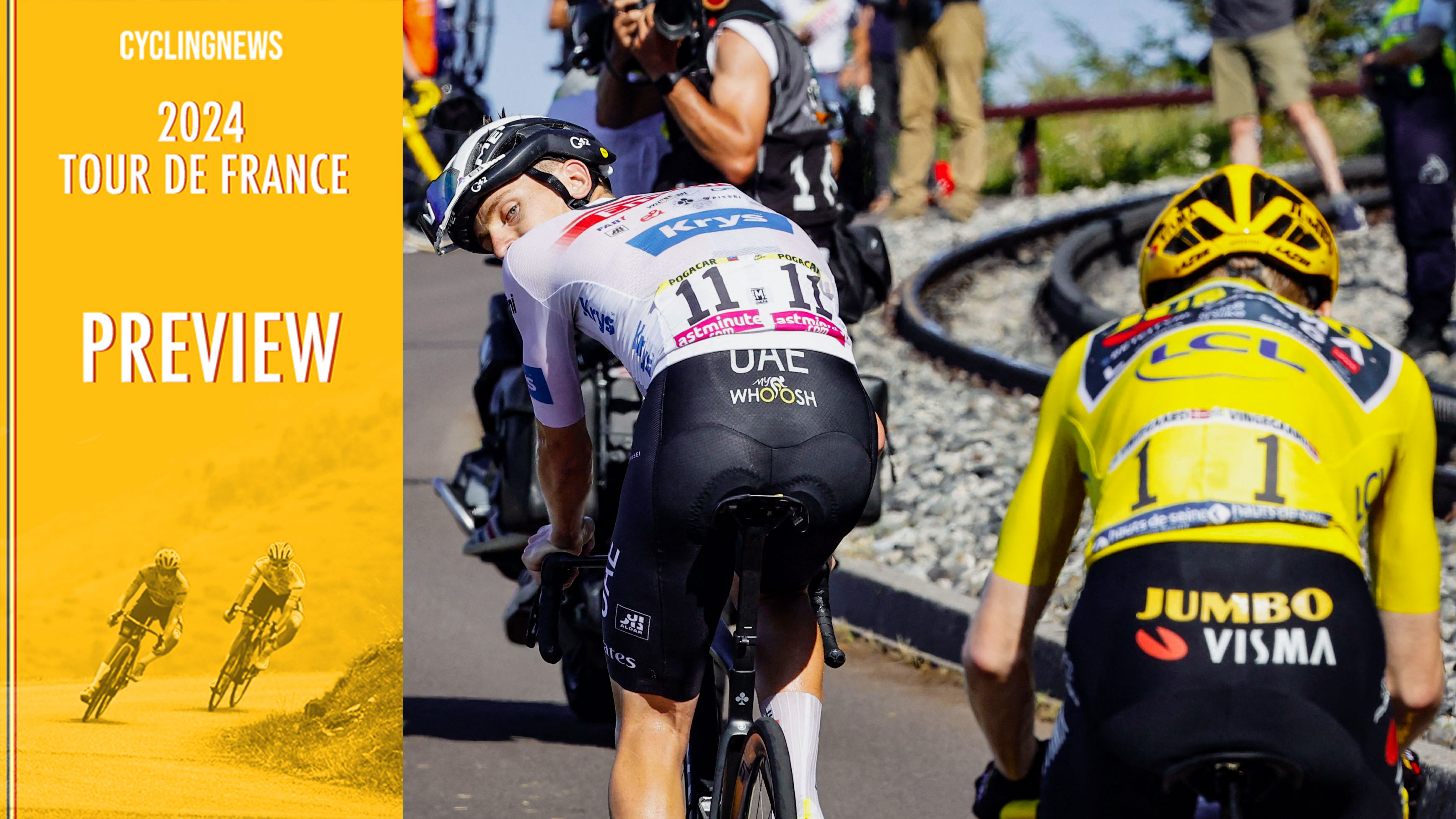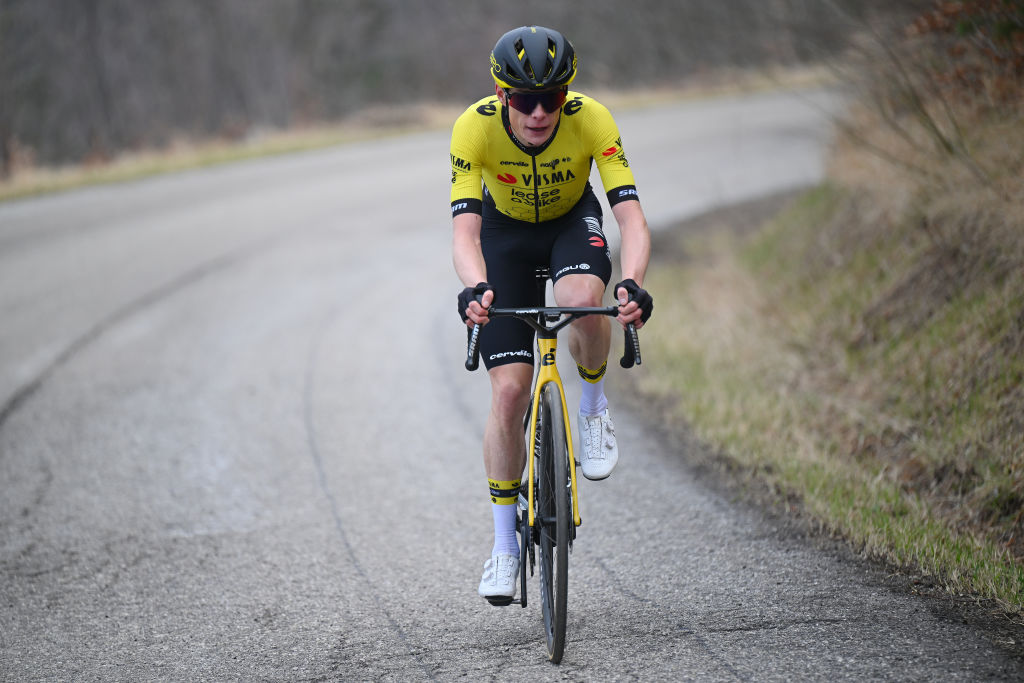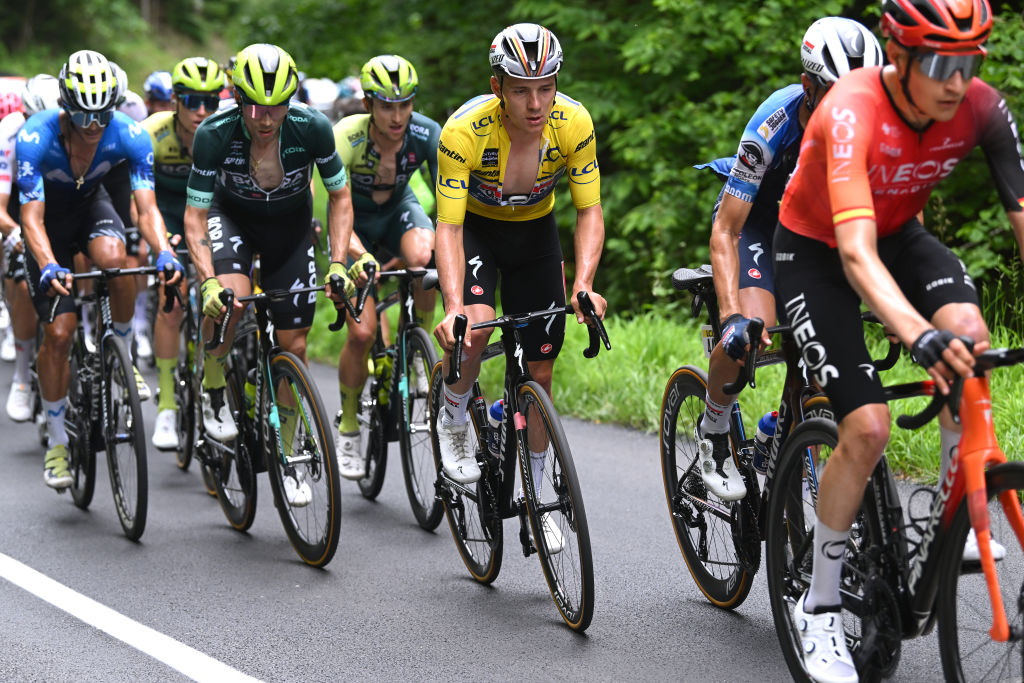Will he or won't he? Doubts over Jonas Vingegaard cloud picture ahead of Tour de France - Preview
Double-chasing Tadej Pogačar sets out as forerunner regardless of whether the defending champion lines up in Florence

Will or won’t he? There are always more questions than answers ahead of the Tour de France, but ten days out from this year's Grand Départ, one unknown still clouds the entire picture. Although Jonas Vingegaard has been training in Tignes with his Visma-Lease a Bike squad in recent weeks, his participation in the Tour remains uncertain, and thus so does the entire complexion of the race.
On the evidence of his crushing early season displays, not to mention his dominance in the past two Julys, Vingegaard had looked set to line up as the outright favourite for this year’s Tour, despite facing the highest calibre opposition the contemporary peloton could offer in Tadej Pogačar, Primož Roglič and Remco Evenepoel.
In the depths of last winter, once those grandees had outlined their race schedules, this Tour was immediately couched as a four-way tussle, but any sober analysis of the hierarchy at that point would have placed Vingegaard on top, simply because the Dane seemed to offer more guarantees for July than his rivals.
Pogačar’s decision to race the Giro d’Italia raised understandable concerns about whether he would be fresh enough to win the Tour, given that nobody has successfully completed that double since 1998. Roglič’s transfer to Bora-Hansgrohe looked a smart one for both parties, but it still wasn’t clear how well he would adapt to a new squad after spending all his professional life at Jumbo. Evenepoel may be an otherworldly talent, but he is also a Tour debutant with lingering doubts over his staying power.
Vingegaard, on the other hand, was settling back into a very familiar routine, riding for the same team and following an almost identical build-up to the Tour by way of O Gran Camiño, Tirreno-Adriatico, Itzulia Basque Country and the Critérium du Dauphiné. Neither he nor his Visma-Lease a Bike team saw any need to change a winning formula, and he duly swept all comers in Galicia and at Tirreno.
Then came April 4 and the descent of the Olaeta, where the outline of this Tour changed utterly in a split second. Vingegaard, Roglič and Evenepoel were among the fallers in the horrible mass crash that marred stage 4 of Itzulia Basque Country, with all three riders forced to abandon due to their injuries.
Each man’s Tour preparation was undoubtedly affected by the layoff, but while Evenepoel and Roglič have since returned to competition and confirmed their participation in July, Vingegaard has yet to pin on a number. Detailed and reliable information about his recovery has not been forthcoming, either from the rider or his team. Outside the Visma camp, at least, everyone is completely in the dark.
Get The Leadout Newsletter
The latest race content, interviews, features, reviews and expert buying guides, direct to your inbox!
When Vingegaard spent twelve days in hospital in Vitoria after suffering a punctured lung and a broken collarbone in the crash, one wondered if his season was already over. Yet when photographs emerged of Vingegaard training in May, first in Denmark and then in Mallorca, it suddenly seemed as though he might line out at the Tour after all. His presence at his team’s pre-Tour camp in Tignes would seem to make his participation a strong probability rather than a mere possibility, but there is still no white smoke from Visma’s selection conclave.

Guessing game
The guessing game will continue until Vingegaard is formally named in the Visma squad. And even then, the speculation will only switch from his participation to the true state of his form. Is it really feasible that a rider can win the Tour when he hasn’t raced since early April and when he spent almost a fortnight in a hospital bed? Expect UAE Team Emirates to test his resolve early and often, starting with the rugged opening stage between Florence and Rimini.
After all, Roglič and Evenepoel, neither of whom suffered injuries as severe as Vingegaard, both insisted that their preparation for the Dauphiné had been affected by their layoffs after Itzulia Basque Country. Those claims were borne out by their performances in the race. It was clear that there had been some understandable gaps in their work in their May training camps.
Although Roglič claimed two stage wins and final overall victory at the Dauphiné, he risked losing it on the final day, and his relative travails against Matteo Jorgenson, Derek Gee and Oier Lazkano raises doubts about his ability to live with Pogačar in the mountains of the Tour. On the other hand, Bora-Hansgrohe sports manager Rolf Aldag has been politely adamant all year that Roglič’s entire season has been built squarely around the Tour, and that his results and performances before July would be essentially meaningless.
In the age of the so-called ‘new cycling,’ we have perhaps grown a little too accustomed to an elite cade of riders hoovering up victories on demand across the calendar. It might – might – be that Roglič’s deliberately steady Tour build-up is a throwback to a decade or so ago, when riders were content to stumble over their lines at the Dauphiné or Tour de Suisse before nailing the script in July. Vincenzo Nibali’s 2014 Tour victory after a low-key start to the year was the obvious example, and Roglič is backed by a strong Bora squad that includes Jai Hindley and Aleksandr Vlasov.
Evenepoel will hope for a similar improvement in the weeks before the Tour. His victory in the Dauphiné time trial augurs well for his prospects in the opening week of the Tour, but he was, by his own admission, some way off his best in the mountains. Ultimately, the race served as something of a public training camp for the Belgian, who knew he still had work to do. At the 2022 Vuelta a España, Evenepoel showed he was adept at finetuning his condition in that final approach to a Grand Tour, and so he will surely be far better in July. But nobody – not even Evenepoel himself – knows if that will be good enough.
No, the only rider offering any guarantees at this point is the very man who took on the risk of torpedoing his Tour chances from the outset by racing the Giro. But instead of digging too deep into his reservoirs in May like Alberto Contador had done in 2015 or Chris Froome in 2018, Pogačar gave the impression in Rome that he still had plenty left in the tank for the Tour.
Pogačar may have been helped by a gentler Giro route and the absence of rivals in the same postcode as his exalted level, but the Italian expedition, like his season before that, could scarcely have gone more smoothly. It is a preposterous thing to see written in black and white, but the Slovenian seemed to ride within himself at the Giro, all while wearing the pink jersey for twenty days, winning six stages and claiming overall victory by almost ten minutes.
Although Pogačar has been the best and most complete rider in the world since he won his first Tour in 2020, Vingegaard in the white heat of July has been his kryptonite. Over the past twelve months, however, Pogačar has been developing the necessary defences to his armoury.
His performances in the time trials at the Giro offered clear evidence of his progress in the discipline – essential in a Tour de France route with 59km against the watch – while his supporting cast at UAE Team Emirates, ostensibly a weak point in years past, looks redoubtable this time out.
While Pogačar was putting the finishing touches to his Tour preparation at Isola 2000 this month, he was able to watch his teammates Adam Yates and João Almeida turn the Tour de Suisse into a procession. They will be joined in July by Juan Ayuso and Pavel Sivakov, leaving UAE with the strongest team on paper, by some distance.
Visma-Lease a Bike have added the impressive Jorgenson to their roster this year, but they have lost some key elements to injury. Doubts linger, too, over the condition of Wout van Aert, a crash victim in the Spring, and Sepp Kuss, below par at the Dauphiné. And there is, of course, the overarching question regarding Vingegaard’s readiness.
It all leaves Pogačar as the obvious favourite for the Tour, despite his Giro exertions, but the picture is a hazy one. The full complexion of this Tour will only sharpen into focus once Vingegaard’s true capabilities become clear.

Trends
Every Tour serves as a bellwether for the current state of cycling, much like the World Cup does for football or the Olympics does for athletics. The fact that three of the four principal contenders for this year’s race suffered potentially Tour-compromising crashes this Spring is as clear an indication as any that safety is an ever more urgent concern for cycling in 2024.
For years – decades, in fact – serious crashes have been followed by earnest talk that ‘something’ must be done to improve safety in the sport. And yet that something never seems to materialise. Year after year and race after race, riders are sent out to compete on courses that routinely prioritise spectacle over security and on equipment designed for speed over safety. A change in culture throughout cycling's ecosystem – including organisers, teams, riders and the sport's governing body – is sorely needed.
Elsewhere, this Tour, like most races this season, seems likely to be a two-tier event. The WorldTour peloton appears to be increasingly divided between the haves and the have-nots, with a small cadre of riders and teams seemingly operating on a different plane to the rest. Pogačar’s almost casual annexation of the Giro was the most obvious case, but Mathieu van der Poel’s dominance at the Tour of Flanders and Paris-Roubaix, and UAE’s hold-up at the Tour de Suisse were other examples of the prevailing trend.
Beyond the four obvious favourites, only Ineos, with Carlos Rodríguez and a resurgent Egan Bernal, will set out from Florence with realistic aspirations of making the final podium in Nice, but even the British team know that, barring a most dramatic twist, overall victory is well beyond their current capabilities.
That said, there are a number of riders on the cusp of a breakthrough at this Tour, including Derek Gee, who so surprised at the Dauphiné. On the other hand, the men most likely to scale new heights in July are probably Jorgenson and Ayuso, two talents already in situ at the two best teams of the moment. Simon Yates (Jayco-Alula), fourth last year, is reportedly due to join Visma in 2025. So it goes.
In the bunch sprints, Jasper Philipsen (Alpecin-Deceuninck) sets out as the man to beat, not least because of Van der Poel’s presence as a deluxe lead-out man. The field also includes Sam Bennett (Decathlon-AG2R), Mads Pedersen (Lidl-Trek) and Dylan Groenewegen (Jayco-Alula), though all eyes will be on Mark Cavendish (Astana-Qazaqstan), as he bids to sign off on his remarkable Tour career by breaking the stage wins record he currently shares with Eddy Merckx.
The route again lends itself to an attritional kind of Tour, with a hilly start in Italy followed by an early ascent of the Galibier on stage 4. The opening week features a 25km time trial to Gevrey-Chambertin and concludes with a run across the gravel to Troyes. After traversing the Pyrenees in week two, the race returns to the Alps in the third week, with the grand finale coming in the hinterland of Nice, which hosts the finish as a one-off due to the Paris 2024 Olympics. The final three days see summit finishes at Isola 2000 and the Col de la Couillole followed by a most demanding final time trial from Monaco to Nice.
Attackers, from Alberto Bettiol (EF Education-EasyPost) to Matej Mohoric, from Pello Bilbao (Bahrain Victorious) to Guillaume Martin (Cofidis), will hope to leave their mark on the race, but they know their ambitions will be at the mercy of how the top tier of contenders – Pogačar, Roglič, Evenepoel and, perhaps, Vingegaard – choose to race.
It’s cycling, but not as we used to know it.
Get unlimited access to all of our coverage of the Tour de France - including breaking news and analysis reported by our journalists on the ground from every stage of the race as it happens and more. Find out more

Barry Ryan was Head of Features at Cyclingnews. He has covered professional cycling since 2010, reporting from the Tour de France, Giro d’Italia and events from Argentina to Japan. His writing has appeared in The Independent, Procycling and Cycling Plus. He is the author of The Ascent: Sean Kelly, Stephen Roche and the Rise of Irish Cycling’s Golden Generation, published by Gill Books.